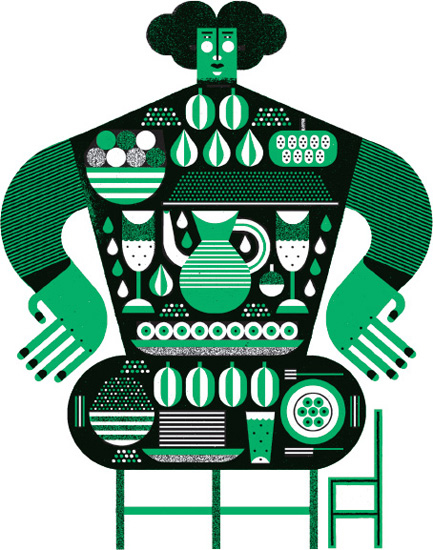She of the Mountains (6 page)
Read She of the Mountains Online
Authors: Vivek Shraya

He tried to remind himself that her breakup with Morty was evidence that heroic sexual prowess was not paramount for her. But despite a lifetime of primarily female friends and a fondness for all-female-cast films like
Boys on the Side
and
Waiting to Exhale
, he was beginning to realize how little he knew about women, particularly about their anatomy. The Women's Network and its soft but mostly concealing body shots did not prepare him for this moment.
Her red scooped-neck shirt came off, followed by her black bra. They
were
big. He didn't realize just how much work a bra did and felt envious of its duty and intimate proximity to her body. He didn't want to stare and give her the impression that he was afraid or turned off, so he closed his eyes, cupped her breasts with his hands, and kissed them. He had read in the sex-advice
column in
Men's Health
that men spent too much time focusing on nipples, so he tried to lavish an equality along the entire breast. He listened closely to the sounds she made as an aural compass to what made her feel good. He listened to the non-vocal cues too, where her body shivered. She also gently directed him, and he was grateful, especially when she guided his hand toward her pussy, an area he did not have the confidence to approach on his own.
He was intimidated by the secrecy of it, its depth. A penis felt comparatively obvious, an extrovert that just needed constant attention. But once his fingers were inside her, the immeasurable wetness produced waves inside his own body, and he found himself wanting to merge both sensations.
The first time she came, she laughed uncontrollably, her head tilted back into the pillow and the back of her hand against her forehead.
Why are you laughing at me?
I am not â¦
Was it ⦠okay? Did I do it right?
It was great!
She laughed again.
Why are you laughing, then?
I just feel so fucking happy.
They were on the floor again, this time at her vacationing friend's place, when they finally found themselves completely naked, side by side. Floors were easy to access, without parental supervision, and heightened the intimacy. Body and body and wood. Body and body and concrete. Body and body and carpet. Her touch was still painful to him, but now, instead of fearing it, fearing what her hands might discoverâthe ugly they might find, the coarseness of a terrain unclaimed or untravelledâhe anticipated it. He desired it.
The first time he came, he apologized.
Why are you sorry?
Was that okay?
Well, was it okay for you?
She squeezed his shoulder.
Yes. Yes. It felt amazing.
After years of hiding and being unseen, her touch was a deep thawing, a permission to feel, a memory of heat lost long ago.


When you were little, I was so worried you would end up fat like your dad, fat like an elephant.
He had often heard about his fat childhood from his mother, about how his auntie had nicknamed him “Butterball” when his ten fingers became so plump that they joined into two lumpy mounds at the base of his arms. His mom had panicked and taken heed of a co-worker's advice that she switch his milk from homo to two-percent. Although his fingers separated again, her fear loomed over his teenage years, evidenced by her frequent descriptions of his childhood body as subtle warnings for his adult body. On the rare occasions he looked at himself in the misted bathroom mirror after showering, he cringed at the sight of his round belly, his mother's foreshadowing ringing in his ears. He was convinced that the words
fat
and
failure
were synonymous to his mother because, in her arguments with his dad, she would first attack his weight and then list the rest of his inadequacies:
FAT
big-mouthed
overspender
selfish
careless
brainless
He tried to be stringent about what he ate, but when he visited his mother's family, his aunties all said the same thing:
You are so skinnnnny! Doesn't your mother feed you?
There was one body that caused him greater discomfort than his ownâhis dad's. His dad would often commence undressing as soon as he walked through the front door, celebrating the end of the work day by shedding layers of clothing throughout their home.
Dad!
he would whine, frantically picking up the discarded clothes, trying not to look as his dad marched around the house wearing only his torn-up, stretched-out briefs.
Why can't you change in your bedroom like everyone else?
Even though, by definition, his dad's name, Sundar, meant beautiful, Sundar himself was repeatedly told otherwise by own mother:
Sundar is fat like an elephant!
Sundar had grown up in a home in which his mother was solely responsible for the food. Even though their servants were allowed to help by acquiring and grating and cutting and chopping and rinsing, the actual act of cooking belonged to her. This was more than just a sense of duty or birthright. In the kitchen, she could transform her love into something edible and sustaining for her six children. In the kitchen, her love was tangible and alive. Perhaps this was why Sundar felt closest to his mother here, watching her knead dough until it was smooth, roll it out into a perfect circle, and flip it on the skillet until lightly browned. Sometimes, before dinner was served to the family, she would secretly feed Sundar the rotis, wrapped around aloo mattar, with her bare hands. He felt guilty that his siblings had not yet eaten but, sensing his worry, she would smile and whisper,
It's best when it's fresh.
Her smile receded as Sundar got older and his body expanded, mirroring her own enormity. Looking at him, she saw an animal, an elephant made of her own flesh, reflecting her own weight. She began to resent his constant need for nourishment and chastised him when he looked for food in-between meals. This only increased his hunger.
Sundar could taste the absence of his mother's love in the food. The roti was bitter, the pilau dry, and, no matter how hot the food was when served, the warmth and taste of the sun was gone. But he kept eating, hoping to find to her love once more.

We don't know how to be a family. Although I have forgiven Shiv, and Ganesh does not remember his beheading, the memory of violence lingers, a bloodstain refusing to be washed away. Shiv tries to earn our trust again by being more present, wandering off less, even in his own mind, and paying attention to our every word and need. Ganesh is still having nightmares, and Shiv is always the first to respond, singing songs about me to soothe Ganesh back to sleep.
Jai Jai Devi Girija Matha
           Â
Jai Jagadambey Pranava Swarupini
                    Â
Ashta Bhujangini Akhilaa Dhari
Jai Yogeeswara Hrudaya Vihari
          Â
He does not understand that there are still days when I cannot bear to look at him, that it might be best for everyone if he returned to his former, mostly removed self.
At times, it is hard to look at Ganesh too. The knowledge of where his head comes from is not only a reminder of Shiv's actions, but it also makes it difficult for me to see Ganesh as one complete being. I recognize his body, the one born from my own, but not his foreign, animal head.
The other gods and celestial beings are not receptive either. Although anyone related to Shiv could be perceived as strange, however revered, Ganesh seems to push the limits of acceptance. I have even heard rumours that the moon mocked Ganesh, particularly his size. (I will obliterate the moon right out of the solar system if these rumours are true.)
Ganesh loves to eat. He befriended a mouse after an incident when both of them fought over the last modaka, only to bond over their common sweet tooth. Together, they consume all the daily offerings that are left at our doorstep by demigods and humans who seek our blessings. A friendship with a rodent only amplifies Ganesh's supposed strangeness, but if the others would only look more closely, they would behold a tender heart, able to love regardless of size or status or expectation. If I could reconstruct my own heart, I would make it identical to his.
I can't help but be mesmerized as I watch Ganesh eat. With every bite, the unrestrained joy in his eyes seems to grow once it reaches his belly, pushing it outward. I can almost taste the ladoo, jalebi, and rasgulla in my own mouth, the sweetness spreading throughout my core. Watching him eat unifies his head and body for me and allows me to see him as one.
Lately, I find myself wondering if this is partly what he has been trying to do for himself as wellâusing food to build a body in balance with his head.

